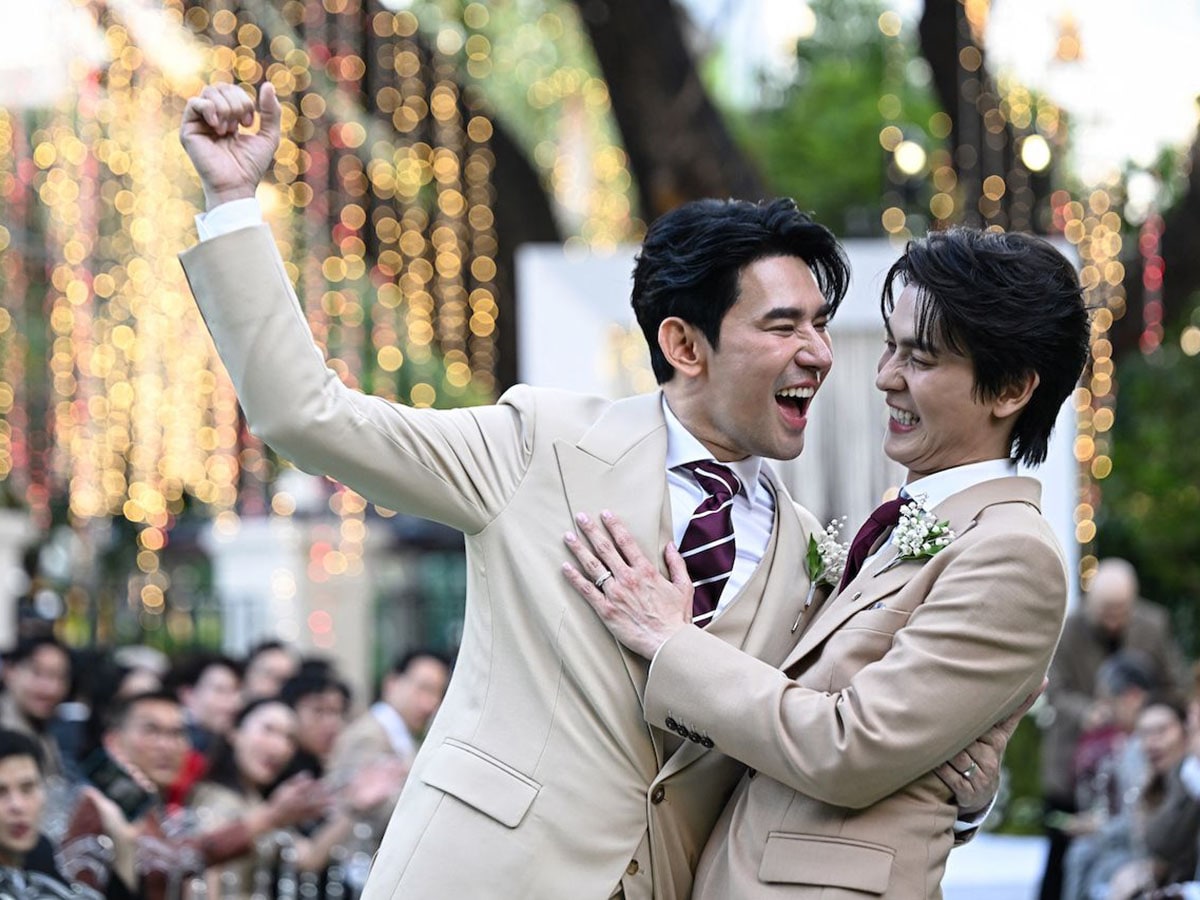 This photo taken on January 10, 2025 shows Apiwat “Porsch” Apiwatsayree (L) and Sappanyoo “Arm” Panatkool posing for photos at their unofficial wedding ceremony in Bangkok.
This photo taken on January 10, 2025 shows Apiwat “Porsch” Apiwatsayree (L) and Sappanyoo “Arm” Panatkool posing for photos at their unofficial wedding ceremony in Bangkok.
Image: Lillian Suwanrumpha / AFP©
Hundreds of LGBTQ couples are set to marry in Thailand on Thursday, as the kingdom becomes the biggest nation in Asia to legalise same-sex marriage.
Thai society has long been seen as accepting of gender-fluid identities and relationships, but matching legal structures were absent.
The new law coming into effect Thursday grants same-sex couples the same legal rights as heterosexual couples.
Three couples in Bangkok told AFP about their hopes for the future.
Legal guardianship
Transgender woman Ariya “Jin” Milintanapa gazed at a family portrait photo, filled with excitement that her dream was finally coming true.
“I’ve been waiting for this moment for more than 10 years,” she told AFP.
The 41-year-old met her American partner, Lee Ronald Battiata, two decades ago on a dating website.
The couple and their two sons share a home in a Bangkok suburb, filled with family photos, chickens, and two parrots.
After school, they take the children to swimming lessons, a passion reflected in more than 20 medals proudly on display.
Chene, 10, is Battiata’s son from a previous marriage, and Charlie, eight, was adopted—though Jin had to adopt him as an individual.
But the new legislation replaces all references to men and women with “partner”, clearing the way for any two people to wed—as long as at least one is a Thai citizen.
“The marriage licence will allow us to share legal guardianship of our kids, as a family,” Jin said.
Battiata, 65, a restaurant consultant, was married twice before and said his relationship with Jin “feels better and stronger”.
“We still do everything we did from the start,” he said.
They will tie the knot Thursday at a Bangkok luxury mall, joining an estimated 300 other couples, according to event organisers.
Despite Thailand’s reputation for tolerance, housewife Jin said she has faced discrimination in everyday situations.
“If I go the market, some people will ask ‘Whose kids are they?'” she said.
“But the boys know I am their mother, and it’s someone else’s business if they don’t understand.”
Also read: ‘Monumental step’ as Thai king signs same-sex marriage into law
Property rights
For Karisa “Fah” Loywisut, 31, and her partner Niramon “New” Kvunkaew, 30, marriage is not just about love, but also equal rights.
The lesbian couple—both office workers—have been together for four years and have a modern, two-storey townhouse in Bangkok’s suburbs.
Both contribute to the mortgage payments, but the deed is solely in Fah’s name as unmarried couples face more hurdles buying property under Thai law.
Marrying under the new law means the pair will be able to re-register their ownership of the property and access joint mortgages.
“Love is important, but rights and legality are just as important,” Fah said.
New, who grew up in a conservative family, said she spent years questioning her identity and was plagued with meeting social expectations.
Her father doubted LGBTQ couples could have successful marriages.
“We always argue,” New told AFP. “I tell him love isn’t tied to gender.”
But their relationship has improved since the government passed the same-sex marriage bill, she said.
Smiling as she shows off a picture of her proposing to New after the bill passed, she said: “It is nice that finally our love will be recognised by the state.”
‘Just the beginning’
Actors Apiwat “Porsch” Apiwatsayree, 49, and Sappanyoo “Arm” Panatkool, 38, are one of Thailand’s highest-profile gay couples, shooting to fame when their proposal video went viral 11 years ago.
They have starred in several “Boys’ Love” series—a male romance genre aimed at straight women—and are among the few openly gay actors in the Thai entertainment industry, which remains socially conservative.
The couple are well-known for their LGBTQ advocacy and celebrated the anniversary of their engagement with an unofficial wedding ceremony in downtown Bangkok earlier this month.
They see the legal change as a turning point for Thailand.
“This is the just beginning of our fight,” said Porsch, calling for the introduction of an anti-discrimination law.
He drew an analogy between same-sex couples’ lack of rights and passengers on a bus not being allowed to wear seatbelts.
“The bus goes on as usual. But if there was an accident, we would be the only ones who were not protected by those seatbelts.”
When their proposal video went viral 11 years ago, an overwhelming majority of the comments were cyberbullying, said Arm.
“Society back then did not understand why two men would get down on their knees and propose to each other,” he said.
“We are ready to have our rights recognised, even if it’s late.”
